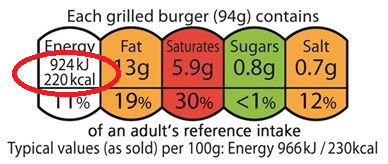A Calorie is just a unit of energy, it originates from the Latin word Calor meaning heat[1], and the French coined the word “Calorie” in 1824[2] (although there is some dispute as to the exact date).[3]
One calorie is the approximate amount of energy required to raise 1 gram of water by 1 degree Celsius (at a pressure of 1 atmosphere)
Another unit of measurement came along shortly after the calorie, the Joule, and was named after James Prescott Joule, an English Physicist in the late 1800s. And there was a dispute for priority between the calorie and joule for common use as a unit of measurement for physical work[4]
In the end, both units persevered and we now also use both the kj – kilojoule (1,000 joules) and kcal (1,000 calories) when referring to food energy.
One calorie is equal to 4.184 joules.
On a food label you will usually see both units expressed.

Why are calories used as a measurement for food?
First we need to explain how calories are measured.
The original method used to determine the number of kcals in a given food directly measured the energy it produced was by literally burning it. The food was placed in a sealed container surrounded by water–an apparatus known as a bomb calorimeter. The food was then completely burned and the resulting rise in water temperature was measured.[5]
With the vast variety of foods available today, it is impractical to burn them all, so the Atwater System is used. Once an average energy amount per gram of protein/fat etc had been established, a scoring system could be used based on the protein, fat, and carbohydrate content of food, and counted up.
The energy values (based on the average heats of combustion of each group and corrected for losses in digestion, absorption, and urinary excretion of urea) are:
- 17 kJ/g (4.0 kcal/g) per 1g protein
- 37 kJ/g (9.0 kcal/g) per 1g fat
- 17 kJ/g (4.0 kcal/g) per 1g carbohydrates
- 29 kJ/g (7.0 kcal/g) per 1g alcohol [6]
While ‘burning calories’ may be a popular phrase, it is not like our bodies has it’s own ‘bomb calorimeter’ and the process of ‘burning fat’, nutrient absorption and storage is far more more complex than this experimental method used to score calories burnt. Our bodies are very complex, requiring a complex blend of macronutrients (protein, carbs, fiber, fat, fatty acids, & water) and micronutrients (vitamins & minerals). Every individual will have different requirements and depending on your individual metabolic rate and activity levels this can greatly differ from person to person, and changes day by day.
So why do we use Calories then? Because it is a very convenient way to enable us to keep track of how much energy we are consuming. Calories only refers to energy and not nutrients.
So before embarking on a strict “calorie counting” diet, rather consider and improve the nutrient composition and variety of your food which will guarantee far more benefits for your overall health and nutritional status.
Here is a good general guide on how to maintain a healthy balanced diet from the NHS:
http://www.nhs.uk/Livewell/Goodfood/Pages/Healthyeating.aspx
[1] Source: http://www.dictionary.com/browse/calorie
[2] Source: http://jn.nutrition.org/content/136/12/2957.full
[3] Source: https://www.sciencedaily.com/releases/2006/11/061120060301.htm
[4] Source: Lindsay BL. Julius Robert Mayer, prophet of energy. Oxford: Pergamon Press; 1973.
[5] Source: https://www.scientificamerican.com/article/how-do-food-manufacturers/
[6] Source: http://oxfordindex.oup.com/view/10.1093/oi/authority.20110803095433186
[7] Source: http://www.nhs.uk/Livewell/loseweight/Pages/understanding-calories.aspx
[8] Source: http://www.dailymail.co.uk/femail/article-2177613/Michael-Phelps-12-000-calories-day-dont-doing-harm.html
[9] Source: https://www.thesun.co.uk/archives/news/329019/15-years-on-nothing-but-chicken-nuggets/


Really great post, I definitely adore this website,
keep on it.
OUTSTANDING Post.thanks for share..more delay.
I love it when folks come together and share opinions, great
blog, keep it up.